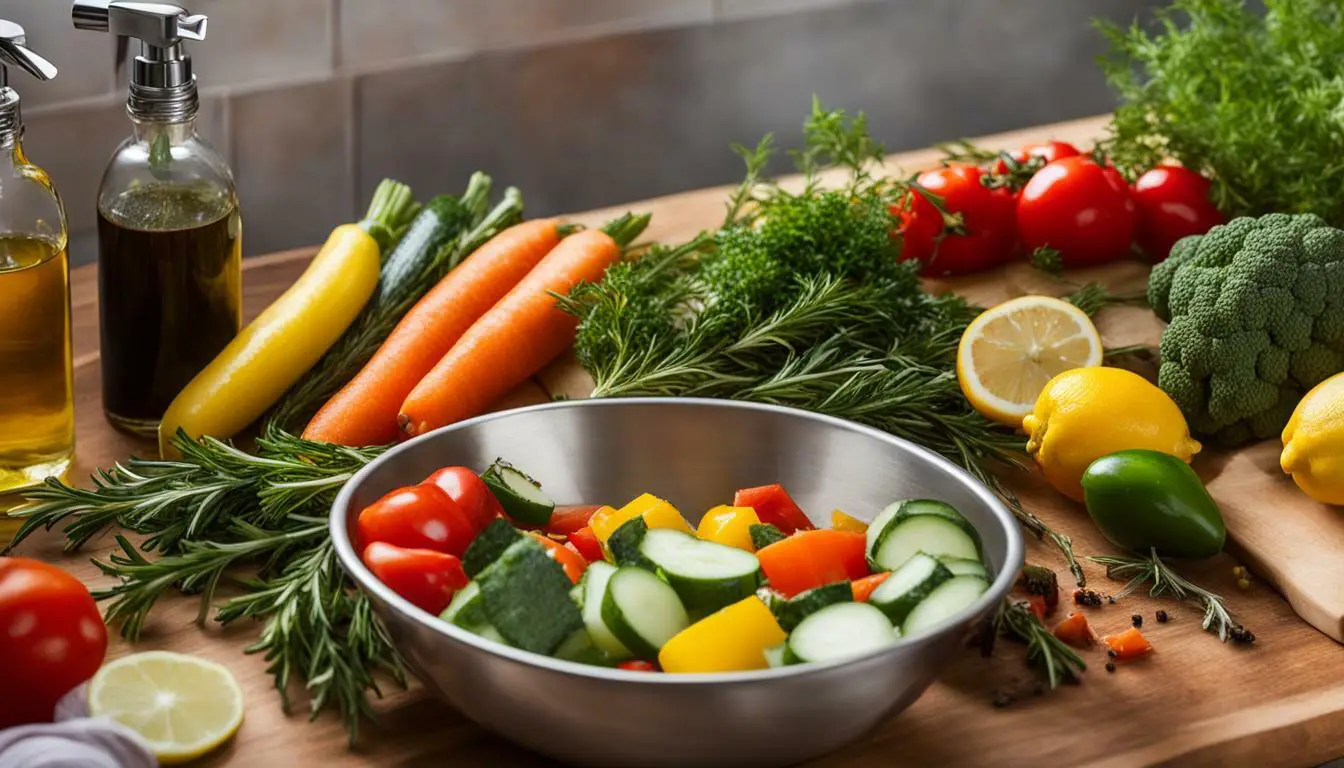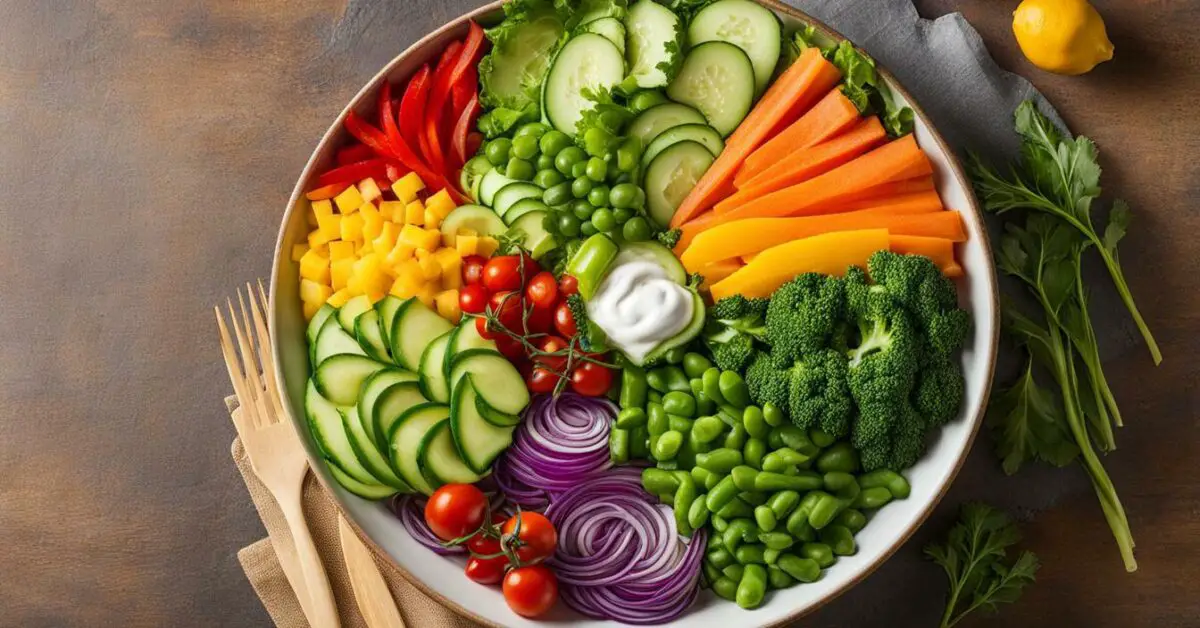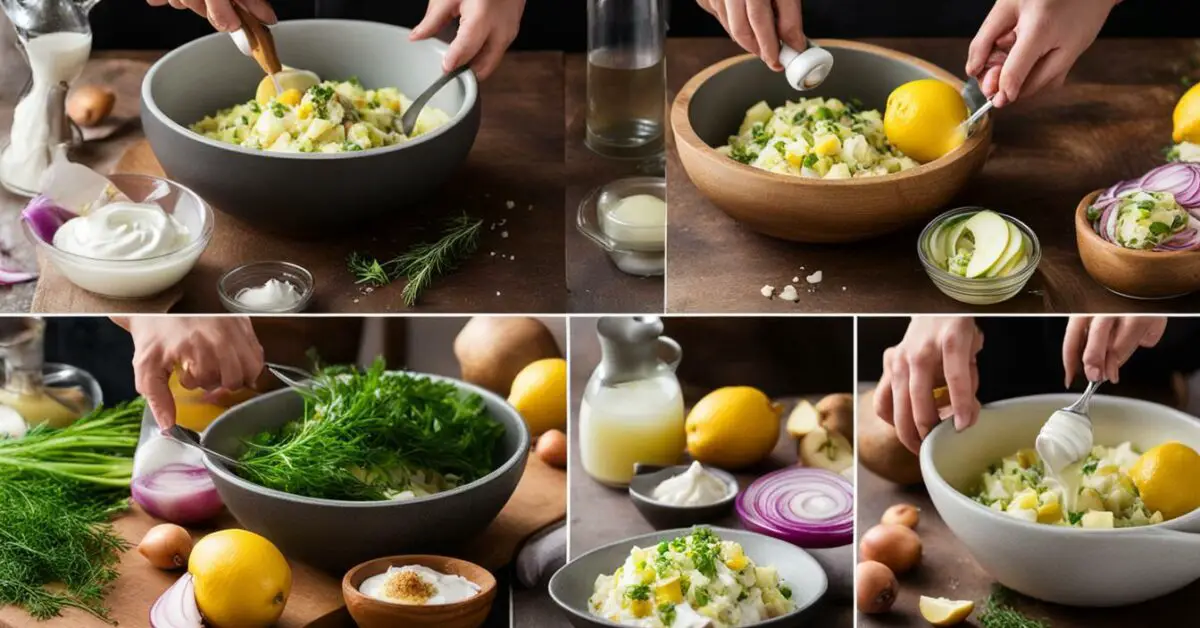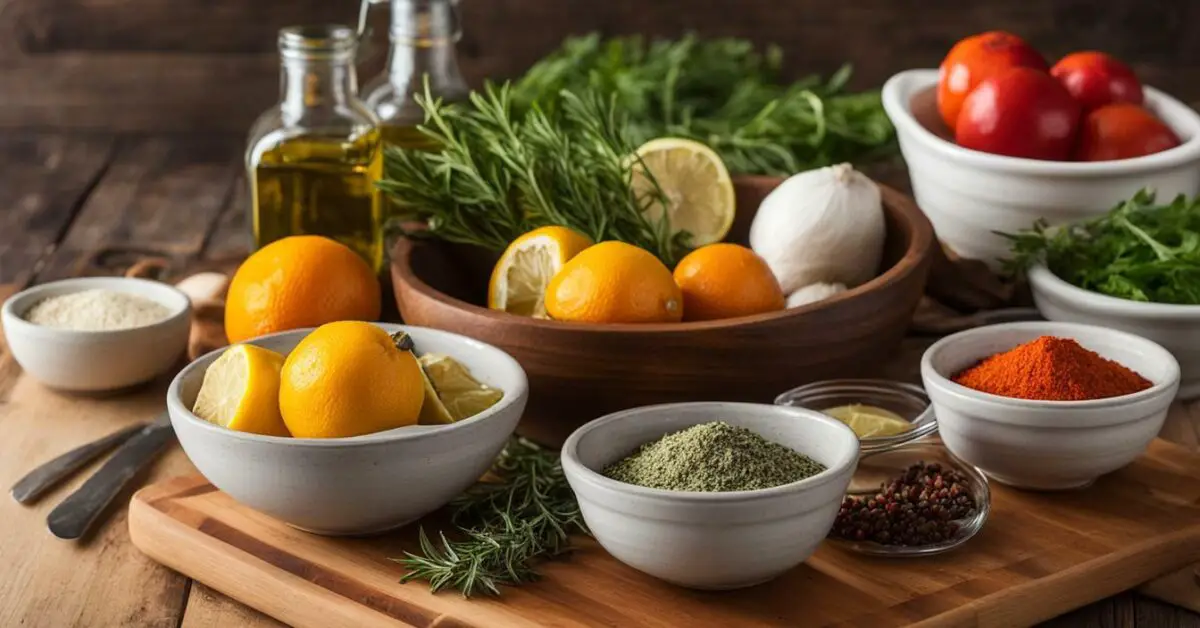
This post may contain affiliate links. Please read my disclosure for more information.
When it comes to washing vegetables, vinegar is a popular choice. However, if you’re looking for substitutes for vinegar, there are three ideal options worth considering.
1. Lemon juice: Fill a bowl with clean water, add a rounded tablespoon of salt and the juice of half a lemon. Soak the produce for a few minutes, then rinse and dry.
2. Baking soda: Use 1 tablespoon of baking soda in a bowl per cup of water. Spray or soak produce and let sit for a few minutes before rinsing. You can also shake baking soda onto the surface of hard-skinned fruits or vegetables and rub in with a bit of water.
3. Hydrogen peroxide: Use a 50/50 mixture of water and 3 percent hydrogen peroxide. Spray or soak the produce in the mix, rinse, dry, and enjoy.
These alternatives can effectively remove pesticides, wax coatings, and bacteria from fruits and vegetables, providing a natural and safe way to clean your produce.
Lemon Juice as a Substitute for Vinegar
Lemon juice can be a great replacement for vinegar when it comes to washing vegetables. Not only does it provide a fresh and citrusy scent, but it also possesses natural cleaning properties that effectively remove dirt, pesticides, and other contaminants from produce. Here are three simple ways you can use lemon juice to clean your fruits and vegetables:
- Lemon Salt Soak: Fill a bowl with clean water, add a rounded tablespoon of salt, and squeeze the juice of half a lemon into the mixture. Submerge the produce in the lemon salt solution and let it soak for a few minutes. Afterward, rinse the vegetables with water and pat them dry.
- Lemon Juice Spray: In a spray bottle, combine equal parts of lemon juice and water. Shake well to ensure the mixture is evenly mixed. Spray the lemon juice solution onto the produce, coating it thoroughly. Allow the solution to sit for a few minutes before rinsing the vegetables with water.
- Lemon Baking Soda Scrub: Create a paste by mixing lemon juice with baking soda until it forms a thick consistency. Apply the paste to the surface of hard-skinned fruits or vegetables and gently rub it in. Rinse the produce with water to remove any residue.
By utilizing lemon juice as a substitute for vinegar, you can effectively cleanse your fruits and vegetables without compromising on safety or natural ingredients. Lemon juice’s acidity helps break down residue and enhances the cleaning process, leaving you with fresh and clean produce to enjoy.
Baking Soda as a Substitute for Vinegar
If you’re looking for a different option to vinegar, baking soda can be an excellent substitute for washing your vegetables. Not only is it readily available in most households, but it also provides effective cleaning properties without any harsh chemicals. Here are three simple ways to use baking soda in your vegetable cleaning routine:
1. Baking Soda Solution:
Create a baking soda solution by mixing 1 tablespoon of baking soda with 1 cup of water in a bowl. Stir the solution until the baking soda dissolves completely. You can either spray this solution directly on the vegetables or soak them for a few minutes. Rinse thoroughly with clean water afterward.
2. Baking Soda Paste:
If you have hard-skinned fruits or vegetables, such as cucumbers or potatoes, you can create a baking soda paste. Sprinkle a small amount of baking soda on the surface of the produce and lightly rub it in with a bit of water to form a paste. Let it sit for a few minutes before rinsing off with water.
3. Baking Soda Rinse:
Another effective method is to create a baking soda rinse. Fill a bowl or sink with water and add 1 tablespoon of baking soda per cup of water. Soak your vegetables in this solution for a few minutes, making sure they are fully submerged. Rinse them thoroughly with clean water afterward.
By using baking soda as a substitute for vinegar, you can effectively remove pesticides, wax coatings, and bacteria from your fruits and vegetables. It is a safe and natural way to ensure your produce is clean and ready to eat. Give these methods a try and enjoy fresh and healthy vegetables with peace of mind!
Hydrogen Peroxide as a Substitute for Vinegar
Another alternative to vinegar in washing vegetables is hydrogen peroxide, which can be just as effective in ensuring food safety. Hydrogen peroxide is a natural disinfectant that can help remove bacteria from produce. Here are the steps to use hydrogen peroxide for washing vegetables:
- Create a mixture by combining equal parts of water and 3 percent hydrogen peroxide in a spray bottle or bowl.
- Spray or soak the produce in the hydrogen peroxide solution, making sure all surfaces are coated.
- Allow the produce to sit in the solution for a few minutes to effectively kill bacteria.
- Rinse the vegetables thoroughly with clean water to remove any residue.
- Dry the produce before consuming or storing it.
Hydrogen peroxide can help remove not only bacteria but also pesticide residues from fruits and vegetables. It provides a safe and natural way to clean your produce, ensuring that it is ready for consumption. Remember to use a 3 percent concentration of hydrogen peroxide, which is readily available at most grocery stores.
Caution:
While hydrogen peroxide is safe to use on produce, it is important to avoid contact with eyes and skin, as it can cause irritation. Additionally, make sure to rinse the vegetables thoroughly after using hydrogen peroxide to remove any traces of the solution. Always follow recommended guidelines for food safety and handling.
Conclusion
In conclusion, lemon juice, baking soda, and hydrogen peroxide are three excellent substitutes for vinegar in washing vegetables, providing safe and effective ways to clean produce.
When it comes to using lemon juice as a substitute for vinegar, simply fill a bowl with clean water, add a rounded tablespoon of salt, and squeeze the juice of half a lemon. Soak your produce for a few minutes, then rinse and dry. This natural alternative will effectively remove pesticides, wax coatings, and bacteria from your fruits and vegetables.
Another great option is baking soda. To use baking soda as a substitute, mix 1 tablespoon of baking soda with a cup of water in a bowl. Spray or soak your produce in the mixture and let it sit for a few minutes before rinsing. For hard-skinned fruits or vegetables, you can also sprinkle baking soda onto the surface and rub it in with a bit of water. This method is effective in removing unwanted residues and ensuring your produce is clean and safe to consume.
Lastly, hydrogen peroxide can be used as a substitute for vinegar when washing vegetables. Create a 50/50 mixture of water and 3 percent hydrogen peroxide. Spray or soak your produce in the mixture, then rinse, dry, and enjoy. Hydrogen peroxide is known for its ability to remove bacteria, making it a great option for ensuring the safety of your produce.
By utilizing these three alternatives, you can effectively remove pesticides, wax coatings, and bacteria from your fruits and vegetables. These natural and safe cleaning methods provide a reliable way to ensure the quality and food safety of your produce. So go ahead and give them a try!
FAQ
Can I substitute lemon juice for vinegar when washing vegetables?
Yes, lemon juice can be used as a substitute for vinegar when washing vegetables. Simply fill a bowl with clean water, add a rounded tablespoon of salt and the juice of half a lemon. Soak the produce for a few minutes, then rinse and dry.
How can I use baking soda as a substitute for vinegar in washing vegetables?
To use baking soda as a substitute for vinegar, mix 1 tablespoon of baking soda with a bowl of water. You can either spray or soak the produce and let it sit for a few minutes before rinsing. Alternatively, you can shake baking soda onto the surface of hard-skinned fruits or vegetables and rub it in with a bit of water.
Is hydrogen peroxide a good substitute for vinegar in washing vegetables?
Yes, hydrogen peroxide can be used as a substitute for vinegar when washing vegetables. You can create a mixture of 50% water and 3% hydrogen peroxide and spray or soak the produce in it. Afterward, rinse, dry, and enjoy your clean produce.
How effective are these alternatives in removing pesticides, wax coatings, and bacteria from produce?
These alternatives, including lemon juice, baking soda, and hydrogen peroxide, can effectively remove pesticides, wax coatings, and bacteria from fruits and vegetables. They provide a natural and safe way to clean your produce for optimal food safety and quality.


